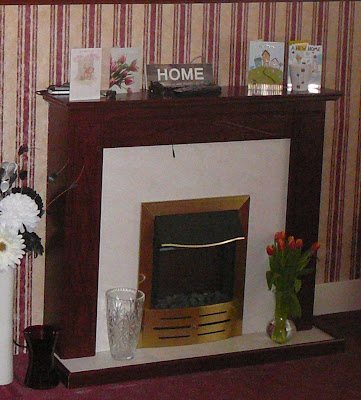Hanging lining paper on the newly plastered wall to ensure a good surface for the wallpaper. Using lining paper should limit shrinkage of the wallpaper by slowing down the drying rate of the paste (stopping the plaster sooking all the moisture out of the paste). As far as I am aware, it doesn't make bumps disappear or improve insulation qualities (as some interwebbers suggest)
Starting to hang the paper on the 3 'plain' walls. I've heard a lot of people's 'top tips' since I've been DIYing - always start in a corner/never start in a corner/work away from the window/start behind the door, etc. usually followed up by "so that you don't see the joints." However, my experience is that as the paper is being butt jointed (i.e. edge to edge) rather than overlapped you don't see the join from one angle any more than another. What I tend to do is measure out the rolls and start in a place which means i'll end with the easiest cut (i.e. don't leave yourself a 3 inch wide strip to cut from a full roll and have to fit that round a window).
With the 3 main walls completed it was time to make a start on the feature wall. We picked wallpaper by the Art Noveau fashion designer Barbara Hulanicki
Hanging this wallpaper required a slightly different planning approach than the 'plain' wallpaper. As it was the feature wall I started by hanging a central strip of wallpaper and working out in both directions to ensure that the pattern was centred on the wall.
The wallpaper was technically difficult to hang as the pattern was contained on each single strip with no edges to match. This meant that to keep the pattern level each strip had to be checked with a spirit level to ensure that the pattern was perfectly horizontal. The alternative option was to offset the pattern, but keeping the pattern perfectly level fitted more with the straight lines of the accompanying Art Deco style of the coving, fireplace, mirror and candle holders.
And there we have it. Wallpapering complete. Carpet and curtains next. Oh, and a lampshade!





.JPG)





